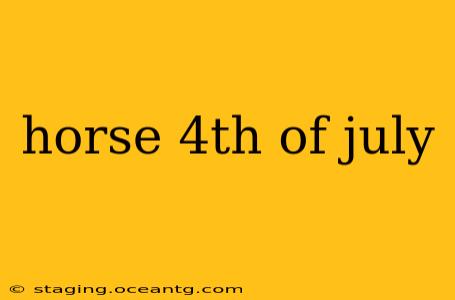The Fourth of July is a time for celebration, but for horses, the loud noises and bright flashes of fireworks can be incredibly stressful, even terrifying. Understanding how to keep your equine companions safe and calm during this holiday is crucial for their well-being. This guide provides essential tips and addresses common concerns horse owners have during this festive period.
What Scares Horses About the Fourth of July?
Horses possess highly sensitive hearing and a keen sense of smell. The loud bangs and unpredictable nature of fireworks are major stressors. The bright lights and sudden flashes can also startle and frighten them. These stimuli can trigger a flight response, leading to dangerous situations.
How Can I Protect My Horse from Fireworks?
Protecting your horse on the Fourth of July requires proactive measures. Here are some key strategies:
-
Bring your horse indoors: If possible, bring your horse into a stable or barn where they are sheltered from the noise and visual stimuli. Ensure the area is well-ventilated and safe.
-
Create a safe and secure environment: Make sure fences are secure and in good repair. Remove any potential hazards within the paddock or stable that your horse might injure themselves on in a panic.
-
Use calming aids: Some horse owners find that calming supplements or calming music can help reduce their horse's anxiety. Consult your veterinarian before using any new supplements.
-
Keep them occupied: Providing your horse with a distraction, like a slow feeder hay net, can help to keep their minds off the fireworks.
-
Stay with your horse: If your horse is particularly sensitive, staying with them can offer reassurance and comfort. Your presence can significantly reduce their anxiety.
What are the Signs of a Stressed Horse?
Recognizing the signs of stress in your horse is vital. Look for:
- Increased heart rate: You might notice a faster pulse.
- Sweating: Excessive sweating can indicate anxiety.
- Restlessness: Pacing, pawing, and other signs of agitation are common.
- Increased respiration: Rapid breathing is another indicator.
- Abnormal behavior: Neighing excessively, bolting, or other unusual behavior.
My Horse is Extremely Afraid of Fireworks – What Should I Do?
If your horse exhibits extreme fear and distress despite your efforts, consult your veterinarian or an equine behaviorist. They can provide personalized advice and possibly recommend strategies like desensitization training to help your horse cope better with loud noises in the future.
Can I Give My Horse Sedatives for Fireworks?
Administering sedatives to your horse without veterinary consultation is strongly discouraged. Improper medication can be dangerous and may cause unexpected reactions. Always consult your veterinarian before using any medication for your horse.
What About Horses in Pastures?
Horses in pastures require extra attention. Ensure the fencing is exceptionally secure, and consider providing a sheltered area where they can seek refuge from the commotion.
How Can I Prepare My Horse for Future Fourth of Julys?
Preparing your horse in advance for future firework seasons can help reduce their anxiety. This may involve gradual desensitization using recordings of firework sounds at low volumes, gradually increasing the volume over time. This should be done under the guidance of a professional equine behaviorist.
By taking these precautions and understanding your horse's individual needs, you can help ensure a safe and less stressful Fourth of July for your equine companion. Remember, a calm and prepared owner leads to a calmer and safer horse.
